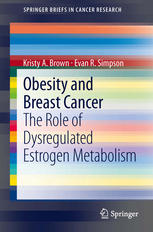

Most ebook files are in PDF format, so you can easily read them using various software such as Foxit Reader or directly on the Google Chrome browser.
Some ebook files are released by publishers in other formats such as .awz, .mobi, .epub, .fb2, etc. You may need to install specific software to read these formats on mobile/PC, such as Calibre.
Please read the tutorial at this link: https://ebookbell.com/faq
We offer FREE conversion to the popular formats you request; however, this may take some time. Therefore, right after payment, please email us, and we will try to provide the service as quickly as possible.
For some exceptional file formats or broken links (if any), please refrain from opening any disputes. Instead, email us first, and we will try to assist within a maximum of 6 hours.
EbookBell Team

5.0
50 reviewsObesity is a risk factor for breast cancer in older women. A number of adipose-derived and obesity-related factors have been shown to affect tumour cell growth. These include adipokines, insulin, IGF-1 and oestrogens. The majority of obesity-related postmenopausal breast cancers are oestrogen-dependent. Since the ovaries no longer produce oestrogens after menopause, and that circulating levels are negligible, it is evident that it is the oestrogens produced locally within the breast adipose that are responsible for the increased growth of breast cancer cells. Aromatase is the enzyme that converts androgens into oestrogens and its regulation is dependent on the activity of a number of tissue-specific promoters. Targeting oestrogen biosynthesis in obesity may be useful for the prevention of breast cancer. Aromatase inhibitors are efficacious at treating postmenopausal breast cancer and recent studies suggest that they may also be useful in the prevention setting. However, these compounds inhibit the catalytic activity of aromatase and as a consequence lead to a number of undesirable side-effects, including arthralgia and possible cognitive defects due to inhibition of aromatase in the bone and brain, respectively. Novel therapies, such as those employed to treat obesity-associated disease, including anti-diabetics, may prove successful at inhibiting aromatase specifically within the breast. This SpringerBrief will explore all of these issues in depth and the authors are in a unique position to write about this topic, having extensive experience in the field of aromatase research.